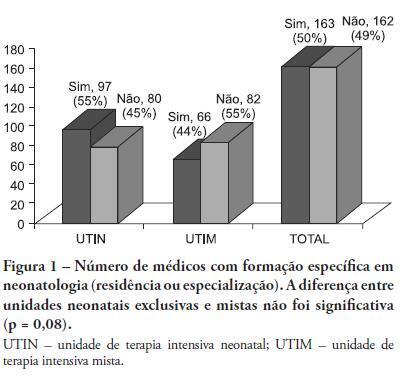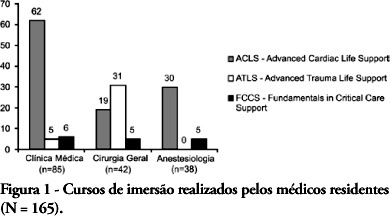Abstract
Rev Bras Ter Intensiva. 2013;25(4):279-283
DOI 10.5935/0103-507X.20130048
To evaluate the level of knowledge of medical students about transplantation and brain death.
An anonymous self-administered questionnaire answered by medical students from the first through the sixth year that was based on information from the Associação Brasileira de Transplante de Órgãos e Tecidos, the Registro Brasileiro de Transplantes and the resolution that defines the criteria for brain death.
Of the 677 medical students asked, 310 (45.8%) agreed to answer the questionnaire. In total, 22 (7.0%) subjects were excluded. Of the students who participated, 41.3% reported having already attended a class on organ transplantation and 33% on brain death; 9.7% felt able to diagnose brain death (p<0.01); only 66.8% indicated the kidney as the most transplanted solid organ in Brazil.
The level of knowledge of medical students at this institution regarding brain death and transplantation is limited, which may be the result of an inadequate approach during medical school.
Abstract
Rev Bras Ter Intensiva. 2011;23(4):462-469
DOI 10.1590/S0103-507X2011000400011
OBJECTIVE: This study described the sociodemographic profile and professional qualifications of pediatric intensive care physicians in the State of Rio de Janeiro (RJ), southeastern Brazil. METHODS: This investigation was an observational, cross-sectional and descriptive study that was conducted in neonatal, pediatric and mixed intensive care units in the State of Rio de Janeiro. Physicians working in the participating intensive care units voluntarily completed a semistructured and anonymous questionnaire. Questionnaires that were not returned within 30 days were considered lost, and questionnaires with less than 75% questions completed were excluded. The differences in neonatal and pediatric intensive care physicians' medical training were compared using the Chi-squared test with a 5% significance level. RESULTS: A total of 410 physicians were included in this study: 84% female, 48% between 30 and 39 years old and 45% with monthly incomes between US $1,700 to 2,700. Forty percent of these physicians worked exclusively in this specialty, and 72% worked in more than one intensive care unit. Only 50% of the participants had received specific training (either medical residency or specialization) in neonatology, and only 33% were board-certified specialists in this area. Only 27% of the physicians had received specific training in pediatric intensive care medicine, and only 17% were board-certified specialists (p < 0.0005 for both comparisons). Most (87%) physicians had participated in scientific events within the past 5 years, and 55% used the internet for continued medical education. However, only 25% had participated in any research. Most (63%) physicians were dissatisfied with their professional activity; 49% were dissatisfied due to working conditions, 23% due to low incomes and 18% due to training-related issues. CONCLUSION: These results suggested that the medical qualifications of neonatal and pediatric intensive care physicians in the State of Rio de Janeiro, Brazil are inadequate, especially in pediatric intensive care medicine. A high level of dissatisfaction was reported, which may jeopardize the quality of medical assistance that is provided by these professionals.

Abstract
Rev Bras Ter Intensiva. 2009;21(2):135-140
DOI 10.1590/S0103-507X2009000200004
OBJECTIVES: Critical Care Medicine is a relatively new specialty, which in recent years has made significant progress in Brazil. However, few physicians are willing to acquire this specialization. The main objective of this study was to describe the factors associated with choice of Critical Care Medicine as a specialty by medical residents of Salvador-BA. METHODS: A cross-sectional and descriptive study, in which a questionnaire was submitted to all residents of the specialties that are a prerequisite for Critical Care Medicine (Clinical Medicine, General Surgery and Anesthesiology), between October and December 2007. RESULTS: The study included 165 residents (89.7% of the total), in which 51.5% were clinical medicine residents, 25.5% were general surgery residents, and 23.0% were anesthesiology residents. Of the respondents, 14 (9.1%) intended to enter Critical Care Medicine residency, although 90 (54.5%) were willing to become intensive care unit physicians after their regular residency. The main reason stated to specialize in critical care medicine was to like work with critically ill patients (92.9%). The main reasons stated not to specialize in critical care medicine, however were related with the poorer quality of life and work. Residents who did intensive care unit initernship during medical studies were more likely to work in an intensive care units after residency. CONCLUSIONS: This population showed little interest to specialize in critical care medicine. The main reasons given for this limited interest were factors related to quality of life and intensive care unit environment. A national survey is required to identify the interventions needed to favor this specialization.

Abstract
Rev Bras Ter Intensiva. 2008;20(4):355-361
DOI 10.1590/S0103-507X2008000400007
OBJECTIVES: Students of Salvador - BA, Brazil were trained in critical care medicine by accomplishing extracurricular internships. This study aims to detect changes in attitude and interest of students who concluded these internships as well as the most frequent activities developed. METHODS: Descriptive cross-sectional survey conducted with students who did extracurricular internships in adult intensive care units during the second semester of 2006. A self-administered questionnaire was given using objective questions. RESULTS: We evaluated 49 students. Interest in becoming an intensivist was classified as high/very high by 32.7% before internship, after which 61.2% reported increased interest. Before internship, students on a 1 to 5 scale rated the importance of critical care medicine as 4.55 ± 0.70. After internship, 98% felt more confident to refer a patient to the intensive care unit, 95.9% to evaluate with supervision, patients admitted to intensive care units and 89.8% to attend patients in the emergency room. The most common procedures observed were: central venous access (100%), peripheral venous access (91.8%) and orotracheal intubation (91.8%). Topics ranked in terms of interest from 1 to 5 were: systemic inflammatory response syndrome/sepsis (4.82 ± 0.48), shock (4.81 ± 0.44) and cardiopulmonary resuscitation (4.77 ± 0.55). CONCLUSIONS: This study showed that internships in adult intensive care units of Salvador (BA), Brazil provided students with greater assurance to evaluate critical patients, increased their interest to follow an intensivist physician career and allowed contact with the main procedures and topics related to critical care medicine.